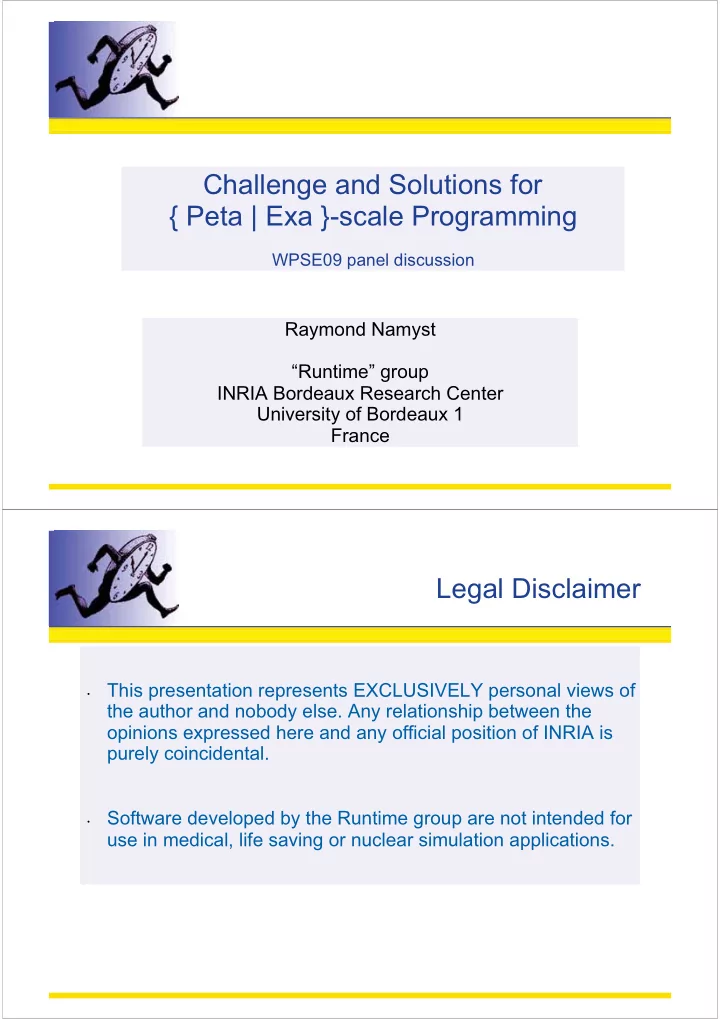

Challenge and Solutions for { Peta | Exa }-scale Programming WPSE09 panel discussion Raymond Namyst “Runtime” group INRIA Bordeaux Research Center University of Bordeaux 1 France Legal Disclaimer This presentation represents EXCLUSIVELY personal views of • � the author and nobody else. Any relationship between the opinions expressed here and any official position of INRIA is purely coincidental. Software developed by the Runtime group are not intended for • � use in medical, life saving or nuclear simulation applications.
Overview of my answers (I will develop them out-of-order!) When will Exa-scale systems come? • � – � November 2018 What kind of programming style remains? • � – � All of them! (I’m afraid we have to solve the hybrid programming problem…) The most difficult challenge for {Peta|Exa}-scale software? • � – � Composability What programming issues are solved/will remain at the end? • � – � Runtime issues will be solved � Your free opinion on {Peta|Exa}-scale application/system • � software? – � I’m scared! What kind of programming style remains? I wish it would be OpenMP 5.0 or XcalableMP 3.0 or UPC 4.0! • � – � We need fine-grain, structured parallelism! However: • � – � We are totally surrounded by (almost) natural born MPI programmers – � MPI has proved to be very efficient on clusters But I don’t believe in the “pure, flat MPI” model • � – � How to develop portable topology-aware applications? – � How to balance load when using 100 cores and 4 GPGPU with MPI? So I think the number of hybrid applications will increase in the • � future – � Note that hybridization may often be indirect – � Parallel Kernels
The most difficult challenges for Peta|Exa-scale software? Fighting against Amdalh… • � – � Exascale computers = embarrassingly parallel machines? Solving the “hybrid programming model” problem • � – � Compatibility � � Ever tried to mix MPI + OpenMP with more than one MPI process per node? � � Technical issues (can be solved by the runtime) – � Composability � � Ever tried to mix OpenMP and MKL? OpenMP and Intel TBB? � � Semantics issues (cannot be solved by runtime only) Providing performance feedback to the programmer • � – � Can we still understand performance? Allowing the user to give scheduling hints • � – � Composability of hints? � What programming issues are solved/will remain at the end? Technical problems can be solved rather easily • � – � However, they may require more inter-domain coordination than today Some problems (composability, feedback) can only be solved • � by a common agreement on – � New parallel language extensions – � New APIs – � And new ideas!
Your free opinion on Peta- and Exa- scale application/system software? Software problems need to be solved at multiple stages • � – � We need to strengthen cooperation between � � Numerical kernel libraries � � Parallel languages compilers � � Runtime systems – � Usually we try to put it all together _after_ the APIs are (independently) fixed � More collaborations between research groups Complex parallel architectures will require powerful runtime • � systems – � Communication, I/O and thread scheduling are highly linked � � Don’t focus on a single aspect – � This is something we have to anticipate! � � Remember how long it took before getting a thread-aware MPI implementation? � Again: more collaborations between research groups! When will Exa-scale systems come? Very difficult question! • � An easiest question would be to guess the vendor that will • � release the first one… – � The machine may have deep blue stickers on it! – � More seriously, it will be a vendor ”MPP” machine But what’s more important is to think about the landscape of • � exa-scale systems – � Probably a large part of commodity clusters (as today) � � With all associated software development intricacies The date? • � – � First Exascale computer will be unveiled at SC 2018 �
Recommend
More recommend